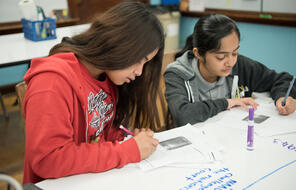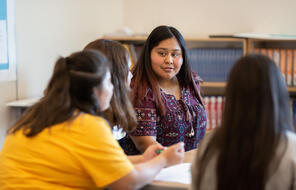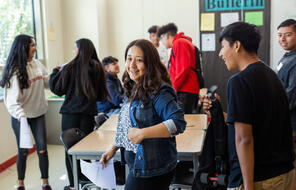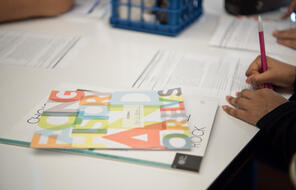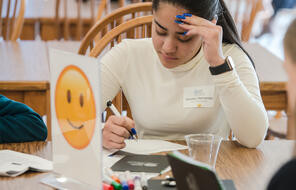KIM PARKER: DisruptTexts is a crowdsourced grassroots organization created by four women of color, I am one of the co-founders, with the goal really of helping teachers dismantle and reimagine their ELA curriculum. Tricia [INAUDIBLE] and I, who was a teacher in Pennsylvania, were fellows in a program eight or nine years ago now, and started working together and then paired up with Lorena Germán and Julia Torres, who were doing similar work.
We all combined forces, and then over the last maybe four or five years, we've been thinking about how do you really look at classics and to help teachers do the work of saying, I don't want to teach that, or I want to do something differently. And how do you do it? So that's really the work that we do. We should always be thinking about what's best for the children, what are the books that kids need now, how do we teach them, how do we do something different, how do we always teach for equity and justice.
The teaching of some books harms kids through, as teachers, our lack of understanding history, our lack of considering kids of color, queer kids, kids who are disabled, all of that group as nonhuman, honestly. That we are something to be sort of explored through literature without understanding that we are human beings.
And so when we make choices about text that might have the N-word over and over again without teaching the context of the damaging history of the word, or of characters who are flat, or of white saviors all the time, it just means that we don't think enough of kids. We don't think enough of their ability to critically analyze and discuss topics and text that they really can. We should give them complex texts that are written by characters of color that feature everyday lives of folks that are non-white, because that's the way you really get to understand the world. That's the way you get to understand other people's experience, and we just don't.
And so what happens, though, is that we will often say we're going to use a text, X text, whatever that text is, and not do our own homework. And to think about how harmful it is. I hear again and again from kids who have sort of gone through K through 12 experiences where they've been the only kid of color in the room, or they've been kids of color and they've had teachers who have said terrible things through the book, and there's been no acknowledgment of that harm. They carry it around.
After we teach a text, we're done. Teachers are done. We're moving on to the next one. But kids are walking around with that pain.
They understand. They understand that when they said something, teachers did not say anything. They understand too that there might be classmates that are also saying something. All of these micro other aggressions that are being committed that no one says anything about.
They need us to stand up for them. They need us to make choices that are going to let their classmates see them, see us as human, full bodied human beings. If we cannot do that, if we cannot make those decisions, then we should not be teaching those texts.
I would also ask, what's the text that kids need at the moment? In this moment, I don't know if they need To Kill a Mockingbird. They might need something else. If they're Black, they just might need something that's just not about any of these current events. Just some joy, some love, some freedom. That's what I would take. Some like everydayness. Those are the books that probably kids need, because we are living in such a racialized society.
Every day, there's something on the news that challenges our humanity, sort of traffics in Black death. And so those are not the stories that I need right now. Those are not the stories kids need either. And also, we should remember too, probably kids aren't going to read it. Or they're going to read it in some way that's not going to be the ways that we, who were literature majors, loved the text.
And also, we should probably remember that most kids who are in high school are not going to be English majors. So what are the skills and the dispositions and habits that we want them to leave with? We want them to leave loving text. We want them to leave loving books.
And so, again, I would imagine too, we want them to leave us knowing that we are teachers who cared about their reading lives and also cared about them. That's how I make my decisions. I love my kids, and I want them to know that there are other books for them that are excellent, that have always existed, that they are welcome to.


